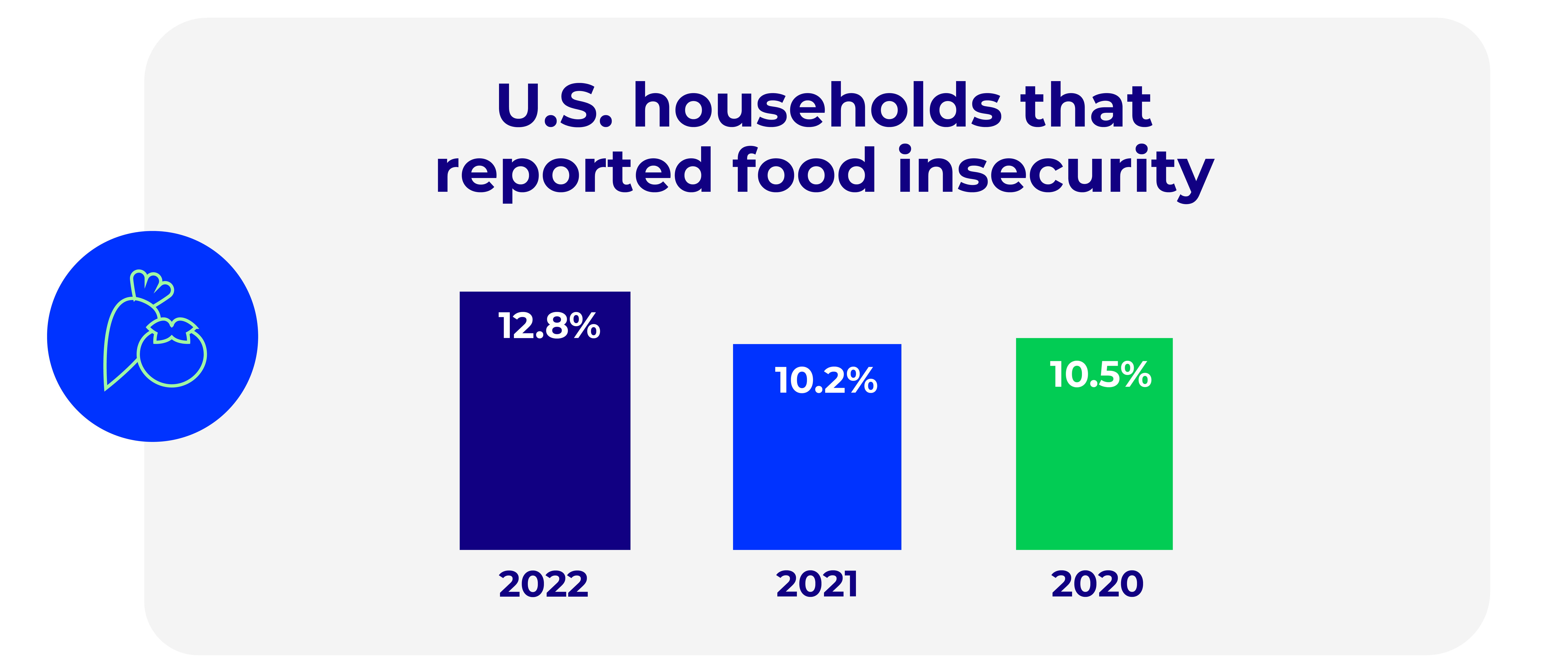
Mothers-to-be hope for a healthy pregnancy and a healthy baby, but access to healthy food can be a major challenge.
Food insecurity during pregnancy not only threatens the well-being of mother and baby – putting them at risk for poor health outcomes, issues with fetal development, and low birth weights – but it also impacts employers, coworkers, and communities. By identifying at-risk mothers early in their pregnancies, employers can help reduce the impact of food insecurity. The first step is improving access to proven whole-health solutions that address food insecurity and improve birth outcomes.
Interconnected factors contribute to food insecurity
Food insecurity is on the rise. In 2022, 12.8% of U.S. households reported they lacked access to adequate food due to limited financial or other resources, up from 10.2% in 2021 and 10.5% in 2020. Women, members of racial minorities, and low-income households are disproportionately impacted, while households headed by single mothers experienced the highest rate of food insecurity in 2022 at 33.1%.

Food insecurity – a particularly challenging social determinant of health (SDOH) – is complex because its causes fall under multiple categories, including income inequity and racial discrimination, and its impact on health and vitality is profound. Understanding these factors is crucial to addressing the problem proactively and comprehensively.
When a woman is pregnant, food insecurity can have additional ramifications. The lack of access to fresh, healthy foods can trigger or worsen chronic diseases, increasing the likelihood of emergency room visits, hospitalizations, and readmissions. One study found families who are food insecure spend $2,500 more per year for health care than families who aren't food insecure. That’s 20% higher than the national average.
Income
Households that include pregnant women or children younger than age two have a high prevalence of food insecurity, according to a 2023 meta-analysis. The analysis found that key factors are unemployment and low household income, which contribute to a limited ability to buy food. In addition, low-income communities tend to lack markets that offer fresh, healthy food choices. This limits dietary diversity and encourages poor diet quality because available foods tend to be high in simple carbohydrates and are ultra-processed, a known risk factor for diabetes.
Income and employment levels are closely linked to ethnicity and gender and redispose women to lower-paid jobs. These disparities were made worse during the pandemic and its aftermath.
Racial disparities
As is the case across many SDOH areas, members of racial minorities experience higher rates of food insecurity than members of other groups due to systemic disparities in our country. The rate of food insecurity in non-Hispanic white households was 9.3% in 2022, less than half that of Hispanic/Latino households (20.8%) and non-Hispanic African American/Black households (22.4%).
While income inequity among these groups contributes to disparities in food insecurity, it is not the only cause. Food accessibility, availability, and utilization are often highly limited in communities with higher populations of non-white households, and the absence of stores selling nutritious and affordable foods and a lack of reliable public transportation create barriers to food security.
Screening and stigma
Physicians and other health care providers who are positioned to address food insecurity in pregnant women may have the opportunity to enhance their practices to identify those at risk for food insecurity and to provide comprehensive support.
For example, obstetrical providers often do not routinely screen for food insecurity. At the same time, largely because of social and cultural stigmas, most pregnant people do not willingly share that they are experiencing food insecurity. A lack of cultural alignment and trust between patients and providers contributes to this reluctance.
Food insecurity impacts more than mothers and babies
The multitude of factors that contribute to food insecurity are matched by the complexity of its impact – on families, employers, and society.
- Mothers: One 2022 study found that women who reported food insecurity during pregnancy also had the highest prevalence of maternal hardships. Chronic food insecurity and resulting poor nutrition can lead to miscarriage, preterm birth, preeclampsia, and other health issues. It can also contribute to increased gestational weight gain and an increased risk of gestational diabetes.
- Babies: Babies who were exposed as a fetus to food insecurity are at risk for health issues including low birth weight, Type 1 diabetes, coronary heart disease, and birth defects.
- Employers: Employers are directly impacted by these trends, since workers with food insecurity are more likely to highly utilize health care resources and are more likely to miss work.
- Society: The U.S. health care system shoulders an additional $53 billion annually as a result of the chronic diseases, emergency department visits, hospitalizations, and readmissions connected to food insecurity across the population.
How employers can help address food insecurity during pregnancy
There is a massive opportunity to improve the accessibility and effectiveness of preventive health care services during pregnancy – especially for those most impacted by food insecurity and other SDOH factors – which can benefit our collective health and outcomes.
At The Cigna Group, we recognize the unique role employers can – and should – play in supporting mothers, which gave rise to a collaboration between Cigna Healthcare and Evernorth Health Services in launching their Pregnancy Support Pilot. Today, the pilot connects customers of all backgrounds to personalized prenatal and postnatal whole-health services that:
- Enable early identification of at-risk expectant mothers and start whole-health evaluation and care.
- Promote healthy birth outcomes and improved maternal and prenatal care for all, especially women who are members of minority populations.
- Support awareness of, and access to, holistic wellness solutions, including risk screenings, no-cost prenatal vitamins and aspirin to prevent preeclampsia (when indicated by a physician), oral health services, behavioral health screenings for depression and anxiety, nutritional education and support, and free monthly home delivery of food boxes for women with food insecurity.
To date, almost 80% of eligible pregnant women engaged in the program; 22% of those who enrolled were identified as high-risk and received the extra support they need.
One participant – a 32-year-old Hispanic/Latina woman pregnant with her first baby – said during her screening interview that she was struggling to buy food after paying her other bills. Her case manager referred her to Foodsmart – a Cigna Healthcare wellness partner – which helped her access local resources, including the Special Supplemental Nutrition Program for Women, Infants, and Children (WIC). Foodsmart also connected her to a social worker. “Foodsmart was extremely helpful, and I'm now getting the food I need to stay healthy,” the member reported back a few weeks later.
We realize that many other mothers and mothers-to-be continue to struggle with food insecurity, and that we need to support our communities. Because food insecurity is connected to multiple social challenges, addressing it directly can yield widespread benefits. Employers who provide solutions acknowledging and addressing food insecurity proactively contribute to a workforce that is more engaged and productive – and to mothers and babies who are healthier members of society.
In the United States, 20% of health care costs are related to poor diets. Lack of access to affordable, nutritious food puts adults and children at increased risk for health issues. To help address these challenges, Cigna Healthcare has partnered with meal kit company HelloFresh to offer discounted access to wholesome, affordable meals to as many as 12 million Cigna Healthcare customers through their employers. Cigna Healthcare is also supporting HelloFresh’s Meals with Meaning program, a social impact initiative that provides free meal kits for people experiencing food insecurity in local communities.

These efforts to fight food insecurity and improve the health and vitality of those we serve is a step toward improving equitable health outcomes for all – including during pregnancy.

Let’s give each person every opportunity to live well.
Health equity is at the heart of our business. See how The Cigna Group is driving change.